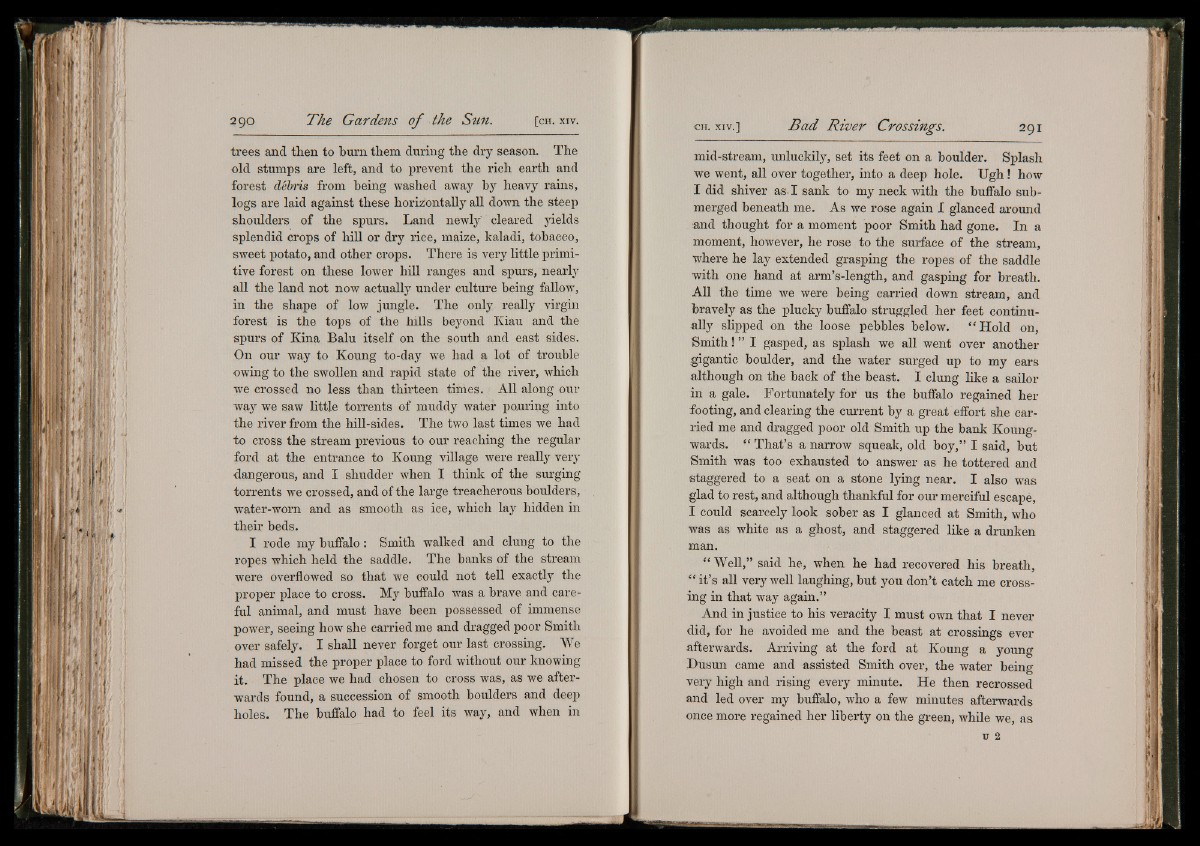
trees and then to burn them during the dry season. The
old stumps are left, and to prevent the rich earth and
forest debris from being washed away by heavy rains,
logs are laid against these horizontally all down the steep
shoulders of the spurs. Land newly cleared yields
splendid crops of hill or dry rice, maize, kaladi, tobacco,
sweet potato, and other crops. There is very little primitive
forest on these lower hill ranges and spurs, nearly
all the land not now actually under culture being fallow,
in the shape of low jungle. The only really virgin
forest is the tops of the hills beyond Kiau and the
spurs of Kina Balu itself on the south and east sides.
On our way to Koung to-day we had a lot of trouble
owing to the swollen and rapid state of the river, which
we crossed no less than thirteen times.; All along our
way we saw little torrents of muddy water pouring into
the river from the hill-sides. The two last times we had
to cross the stream previous to our reaching the regular
ford at the entrance to Koung village were really very
dangerous, and I shudder when I think of the surging
torrents we crossed, and of the large treacherous boulders,
water-worn and as smooth as ice, which lay hidden in
their beds.
I rode my buffalo: Smith walked and clung to the
ropes which held the saddle. The banks of the stream
were overflowed so that we could not tell exactly the
proper place to cross. My buffalo was a brave and careful
animal, and must have been possessed of immense
power, seeing how she carried me and dragged poor Smith
over safely. I shall never forget our last crossing. We
had missed the proper place to ford without our knowing
it. The place we had chosen to cross was, as we afterwards
found, a succession of smooth boulders and deep
holes. The buffalo had to feel its way, and when in
mid-stream, unluckily, set its feet on a boulder. Splash
we went, all over together, into a deep hole. U gh ! how
I did shiver as I sank to my neck with the buffalo submerged
beneath me. As we rose again I glanced around
and thought for a moment poor Smith had gone. In a
moment, however, he rose to the surface of the stream,
where he lay extended grasping the ropes of the saddle
with one hand at arm’s-length, and gasping for breath.
All the time we were being carried down stream, and
bravely as the plucky buffalo struggled her feet continually
slipped on the loose pebbles below. “ Hold on,
Smith! ” I gasped, as splash we all went over another
gigantic boulder, and the water surged up to my ears
although on the back of the beast. I clung like a sailor
in a gale. Fortunately for us the buffalo regained her
footing, and clearing the current by a great effort she carried
me and dragged poor old Smith up the bank Koung-
wards. “ That’s a narrow squeak, old boy,” I said, but
Smith was too exhausted to answer as he tottered and
staggered to a seat on a stone lying near. I also was
glad to rest, and although thankful for our merciful escape,
I could scarcely look sober as I glanced at Smith, who
was as white as a ghost, and staggered like a drunken
man.
I Well,” said he, when he had recovered his breath,
“ it’s all very well laughing, but you don’t catch me crossing
in that way again.”
And in justice to his veracity I must own that I never
did, for he avoided me and the beast at crossings ever
afterwards. Arriving at the ford at Koung a young
Dusun came and assisted Smith over, the water being
very high and rising every minute. He then recrossed
and led over my buffalo, who a few minutes afterwards
once more regained her liberty on the green, while we, as
u 2